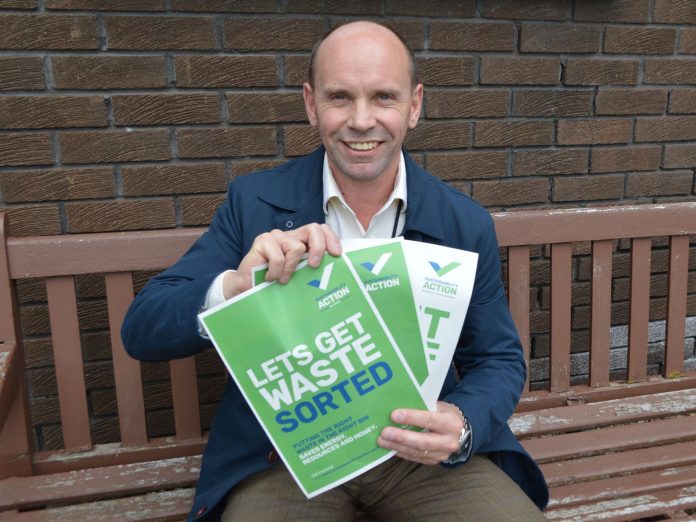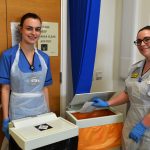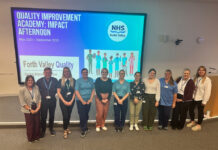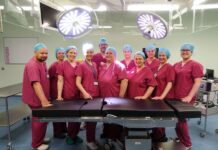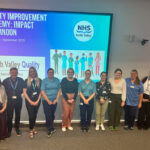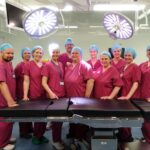Make no mistake. Little changes can make a big difference. Switching off lights when its bright outside, putting the right stuff in the right bin, thinking twice about whether you really need to travel to work by car and focusing on what can be recycled. Just a few suggested behaviour changes which could not only save money, but in the long term help save the planet.
Research has shown that many NHS Staff don’t really know what sustainability is, and means. In short it’s about our role in ensuring the health service is financially and environmentally sustainable – so that we are able to meet the needs of today’s patients and future generations.
It is time now for everyone to take stock and think about the price our children and future generations will have to pay for two or three carbon-happy generations.
Derek Jarvie, NHS Forth Valley’s Environmental & Sustainability Manager, joined us in December 2017 and has been working since then to help get the Board’s ‘house in order’ from a sustainability perspective.
He explained: “I would like to see everyone working for NHS Forth Valley pulling together to minimise the environmental impacts within their control both at work and at home.
“There are no one-size-fits-all solutions, but we can all make small changes to ensure we are managing resources more efficiently so that our children, our grandchildren and future generations have a planet that they are able to live on.”
This is the core message of Sustainability Action, a new national brand developed for NHS Scotland which we’ll be seeing a lot more of in future. As an organisation we have an important role to play in protecting the environment for residents, patients, staff and visitors. We are also a major employer and purchaser of goods and services.
What we do and how we do it can have an adverse impact on the environment and on the health and wellbeing of local people.
So what have we done so far?
Energy Efficiency
Our Estates Department already has a rolling programme of work underway to deliver the energy and carbon targets set out in the new Sustainability Action Plan. In 2018/19 we delivered several energy efficiency projects – 2000 lights were replaced with LED fittings in 18 health centre and hospital buildings, external lighting was upgraded to LED at 9 health centre and hospital sites and older, less energy efficient boilers and heating systems have been replaced with highly efficient equipment at six sites across NHS Forth Valley. Moving forward, these changes will not only help save energy and reduce our impact on the environment, but will also deliver savings in excess of £40,000 each year.
Other notable energy efficiency projects delivered recently by the Estates Department include: installation of LED lighting within buildings at Stirling and Falkirk Community Hospitals and ‘street’/car park lighting upgrades to LED at Bellsdyke, Bo’ness and Loch View Hospitals.
Further lighting and heating upgrades will be delivered by the Estates Department over the next 12 months.
A range of energy improvements have also been delivered through the development of the new Stirling Health and Care Village. These include the decommissioning of large steam boilers, the replacement of a number of older buildings across the site with two new highly energy-efficient buildings (the GP and Minor Injuries Unit and the Bellfield Centre).
At Forth Valley Royal Hospital whilst maintaining safe levels of lighting, every second light has been switched off effectively reducing cost by 50% within the main areas. In addition stairwell lighting has been replaced with LED with auto dim and motion sensor capabilities. Similarly en-suite bathroom lighting has also been replaced with LED fittings throughout the hospital.
Other energy saving schemes which have been introduced are more energy efficient chillers and replacement of ward pantry dishwashers with new energy efficient models.
Forth Valley Royal Hospital and Larbert Woods have also been accredited with a Keep Scotland Beautiful award and a new Building with Nature Excellence Award. These recognise the site as an exemplar in design, delivery and maintenance of high quality green infrastructure that benefits people and wildlife.
So what next?
NHS Forth Valley’s Sustainability Strategy was approved by the Senior Leadership Team earlier this year and a Sustainability Action Plan has been developed to help reduce the Board’s environmental impacts between now and 2024. Over the same period the aim is to reduce energy consumption in our buildings by 25% and reduce our overall carbon footprint by 30%.
A new Sustainability Working Group has been established to help coordinate and drive this important work forward. The Group is made up of a cross section of staff including dieticians, theatre, public health, nursing, transport, occupational health and estates staff. They meet regularly throughout the year to discuss and prioritise the delivery of projects.
Key opportunities where we can reduce impacts and potentially deliver financial savings include active travel and transport, green space, nature and biodiversity, reduction of waste, more efficient use of resources and the purchase of more sustainable, environmentally friendly and energy efficient equipment and supplies.
Options and opportunities in each of these areas will be developed in the coming weeks. We are also working closely with our facilities partners SERCO
So what can you do to help?
Heating
If your department, ward or office is COLD check that:
- Windows are closed and draft free.
- External doors are kept closed.
- Make sure radiators are not blocked by equipment or furniture.
Please avoid the use of portable electric heaters if possible. They are expensive to run, result in about three times more carbon dioxide emissions than gas and can affect the settings on a heating control system.
If your workplace is too HOT:
- Use the thermostats on the radiator (if fitted) to control the temperature or shut off some of the radiators.
- DO NOT regulate the temperature in the room by opening windows as the heating may still be on.
- Don’t have air conditioning/cooling on at the same time as the room heating is on.
Lighting
- Make sure that lights are turned off in changing rooms, stores cupboards and toilets when they are not in use.
- Turn off the lights when you leave a room unoccupied, even for a short period.
- On bright days try turning off the artificial lighting; most people find natural daylight provides a better working environment.
- Remember that the safety of patients, staff and visitors is of paramount importance so only turn off lights if appropriate and safe to do so.
Electrical Equipment
- Set up your PC so that it switches to power-save mode if it is not being used. Screen savers do not save energy.
- Make sure that the power-save mode on photocopiers is switched on.
- Switch off as much electrical equipment as possible at weekends and overnight (where safe and appropriate to do so).
- Avoid leaving equipment on stand-by if possible. The stand-by mode can use as much as half the energy required when the machine is working.
- Don’t place fridges or vending machines close to heaters or in areas where there is strong sunlight.
- Unplug chargers for mobile phones when not in use as they still use energy when plugged in.
In the coming months there will also be a focus on minimising waste and maximising recycling. This will include looking at ways of reducing food waste, clinical waste and theatre waste as well as looking at how we use and dispose of ‘single use’ plastic items and other waste.
A survey at Crosshouse Hospital in Kilmarnock on disposable cups discovered general uncertainty over which items were recyclable, little in the way of recycling information and a lack of specific bins for cups and to drain fluids. Researchers concluded that staff on the tills had a huge role to play in education and suggestions included more signage, new bins specifically for cups which could be recycled and re-usable cups to be issued free to all staff. Work will be undertaken to look at how the learning from this work could be replicated at our own sites to help boost recycling rates.
NHS Forth Valley has also signed up to use WARPIT – the Waste, Action, Re-use website – which is designed to allow organisations to give away, reuse or loan office furniture, equipment and other resources internally or with other organisations to help reduce waste. To find out more, add items which you want to get rid of or search for items you want visit www.warp-it.co.uk Using this website has saved around £4,258 in the last year in NHS Forth Valley and helped avoided waste charges. Some of the larger NHS Boards have saved more than half a million pounds since they joined so there is still some way to go but lots of potential to reduce waste and recycle items which you no longer want.
Everyone has an opportunity now to ‘step up’ and be part of the solution – it’s often the little things that help most and add up to making a real difference.
